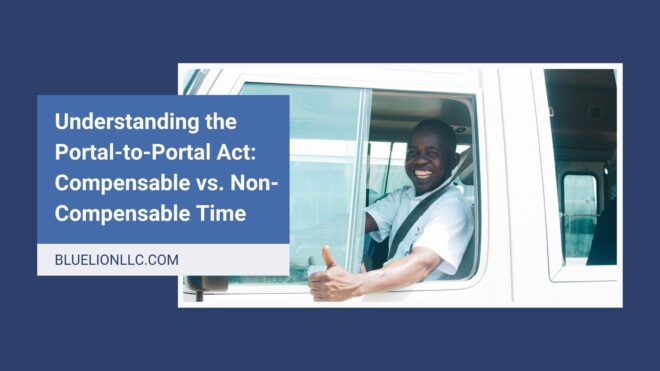
In the ever-evolving landscape of employment law, employers must clearly understand their rights and responsibilities. One piece of legislation that often raises questions is the Portal-to-Portal Act. Passed in 1947, this amendment to the Fair Labor Standards Act (FLSA) defines compensable working time for employees.
Many employers ask whether they must pay employees for time spent on certain tasks or travel. Check out our quick breakdown below.
The Portal-to-Portal Act: An Overview
The Portal-to-Portal Act outlines what activities are considered part of an employee’s compensable workday and what activities are not. The Act primarily deals with travel time and other activities that occur before or after the official workday.
Compensable Working Time
Under the Act, time spent on principal activities integral to the job is considered compensable. This includes setting up work equipment, safety checks, or other tasks necessary for the job’s performance.
This also means that activities like breaks of 20 minutes or less (e.g., coffee or rest breaks), emergency drills, and meal breaks if the employee must remain on duty or the break is shorter than 30 minutes. According to the Department of Labor (DOL), time spent in pre-shift meetings is usually payable, too.
Of course, defining compensable time is not always black and white. Most employers don’t have to pay workers for washing up before or after work. However, certain companies may have to pay for this time if the employee’s job involves hazardous materials, in which case this activity is considered an integral and indispensable part of their job and safety.
Non-Compensable Working Time
Generally, the time employees spend commuting to and from work is not compensable under the Portal-to-Portal Act. This is considered ordinary travel that is not directly related to the job.
Activities that are preliminary to or postliminary to the employee’s work-related tasks are usually not compensable. For example, time spent waiting for an employer-provided shuttle to the worksite is typically unpaid unless specific circumstances apply.
Additional activities that employers do not have to pay workers for include:
- Meal times while traveling for work
- Attending an optional training, seminar, or conference not directly related to the employee’s job
Off-site Parking, Employer-Provided Transportation & Waiting Time
One tricky area related to the Portal-to-Portal Act is off-site parking and employer-provided transportation to the worksite. Typically, courts have found the following time is not compensable:
- Waiting before employer-provided transportation to the worksite
- Travel time to the workplace*
- Time spent traveling back to the pick-up/drop-off destination
*Courts have ruled that employers must pay workers who are required to report to a separate destination for things like meetings, instructions, and equipment. However, travel time to a different meeting place is NOT compensable if the employees do so voluntarily.
The employer may also be responsible for paying employees who spend time waiting at a job site to start work. This may occur if the workers arrive before the necessary equipment does, preventing them from conducting their principal duties. In this case, the employees would be considered “engaged to wait.”
Final Thoughts on the Portal-to-Portal Act
The Portal-to-Portal Act defines compensable time as spent on activities integral to the job. Regular commuting from home to the workplace is generally not compensable. Additionally, time spent waiting at and traveling to and from offsite parking via employer-provided transportation is usually unpaid.
Employers should understand their rights and responsibilities under this Act, but we know it can get confusing. Compliance with the Portal-to-Portal Act is crucial to ensure fair compensation practices and avoid potential legal issues. Consult with your legal counsel or HR team if complex or unclear scenarios arise—BlueLion is always here to guide you! Contact us at 603-818-4131 or info@bluelionllc.com to speak with an HR professional today.



